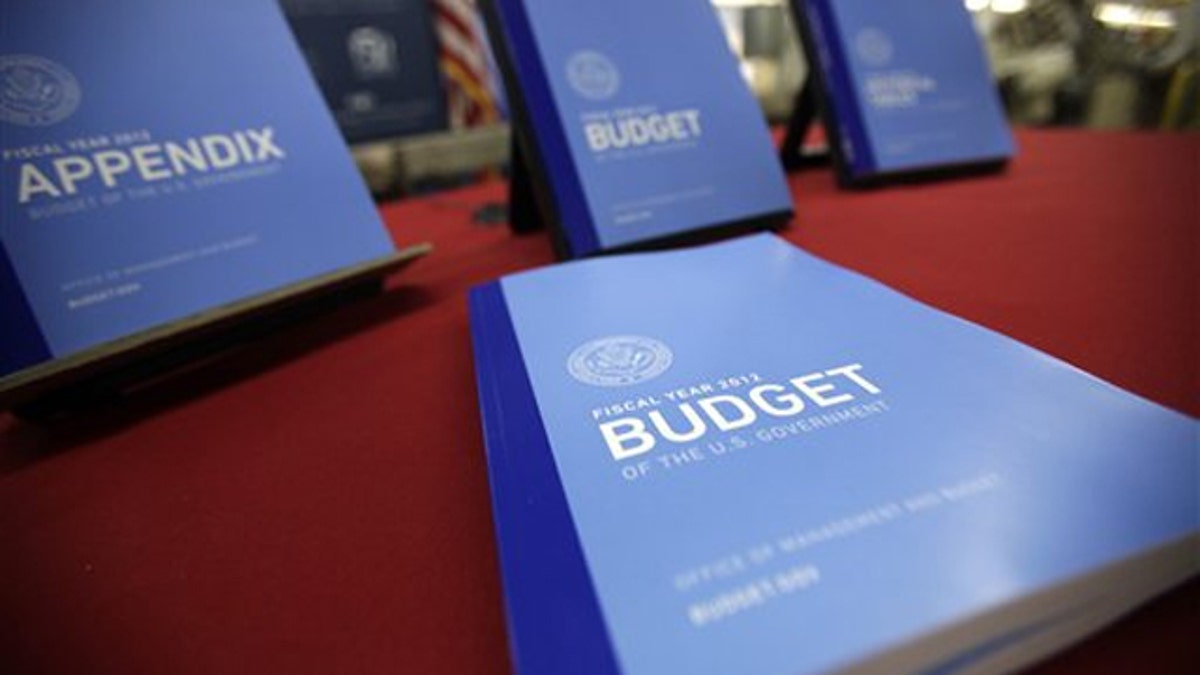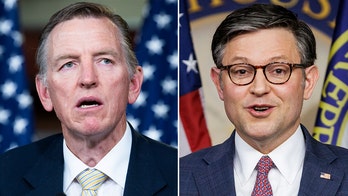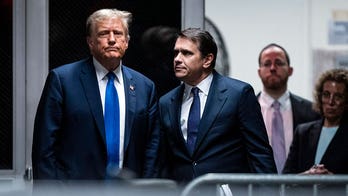
In this photo taken Feb. 10, the 2012 budget is on display at the U.S. Government Printing Office in Washington. (AP)
Republicans looking to make deep spending cuts are girding for twin budget battles in Washington starting this week -- a fiscal fight one lawmaker said will define the rest of President Obama's term.
The president plans to unveil his 2012 spending plan Monday, a $3.5 trillion-plus budget which, according to officials, will outline $1.1 trillion in deficit reduction over the next decade. At the same time, Republicans are still trying to cut back this year's spending. They want to bring a bill to the floor Tuesday that they claim would cut $100 billion out of the budget for the seven months remaining in the 2011 fiscal year.
Top GOP lawmakers said Sunday they were hopeful the Obama administration would play along, and endorse a plan to sharply reduce short- and long-term spending.
But they said the snippets of information out about the upcoming budget plan suggest the president's not being ambitious enough in tackling what they describe as a fiscal "crisis." They said the proposals on the table so far will not reverse the "unsustainable" rise in the national debt.
"This is his final opportunity to change the course," Sen. Jeff Sessions, R-Ala., ranking Republican on the Senate Budget Committee, told Fox News, casting the upcoming debate as a make-or-break moment for the president. The same could be said for Republicans elected on a pledge to cut spending.
Sen. John McCain, R-Ariz., said the political atmosphere -- one much more focused on fiscal discipline in the wake of last year's election -- gives him "guarded optimism" about what can be achieved. Still, he predicted a seminal debate on the horizon.
"I think it's going to be a confrontation," he said on CBS' "Face the Nation." "I hope it's one that can be worked out between the president and Congress."
Compounding the friction between the parties is a looming vote on whether to raise the $14.3 trillion debt ceiling. Republicans have vowed to extract painful concessions from Democrats in exchange for their support and will surely use that vote as leverage in the upcoming budget battles.
How precarious this game of chicken becomes is unclear. Aside from the possibility of a debt-limit freeze, which could result in default, one freshman GOP lawmaker suggested last week that a 1995-style government shutdown could still be in the cards. Rep. Tim Scott, R-S.C., told Fox News that "nothing's off the table."
But House Speaker John Boehner downplayed the likelihood of such an outcome Sunday on NBC's "Meet the Press."
"Our goal is to reduce spending," he said. "It is not to shut down the government."
The tone of the 2012 budget debate will likely be set during the more immediate debate over this year's budget.
After some internal wrangling over how much to cut, Republicans late last week said they would propose a full $100 billion in cuts for the rest of the fiscal year. Compared to last year's budget, the savings amount to about $61 billion. Among the programs targeted are health research, foreign aid, the Peace Corps and pre-kindergarten education.
"We must reverse this spending binge as quickly as possible," Boehner said in a letter to Obama dated Sunday, casting budget cuts as a booster for the economy.
In the face of criticism from Democrats that the cuts are too far-reaching and ideologically driven, Republicans say Democrats have offered no credible plan of their own.
White House Budget Director Jacob Lew, pressed to weigh in, reserved comment on the GOP plan Sunday.
"We look forward to working with Congress," Lew said three times, without elaborating, when asked about the GOP proposal on CNN's "State of the Union."
No matter how intense the fight, it will only apply to seven months of spending, or less. Looking ahead to the debate over the 2012 budget and beyond, Republicans warned Sunday that Washington will be no place for meek fiscal proposals.
The deficit for 2011 alone is projected to hit a record $1.5 trillion. Congressional Budget Office Director Douglas Elmendorf told a congressional committee last month that cumulative deficits over the next 10 years could run as high as $12 trillion. He said without serious cutbacks, the national debt could reach nearly 100 percent of GDP in that period.
Rep. Paul Ryan, R-Wis., chairman of the House Budget Committee, acknowledged that Obama is pushing a five-year domestic spending freeze, which the administration says will save $400 billion over 10 years.
But he said that based on what he's seen in press reports, the 2012 budget plan is "very small on spending discipline."
"It looks like the debt's going to continue rising under this budget," Ryan said of Obama's plan.
Lew rejected the notion that the administration isn't making the tough decisions.
"There are scores of programs that are being reduced. And I think it's important to note that we're beyond the easy, low-hanging fruit to say that it's all waste and fraud. We're reducing programs that are important programs that we care about, and we're doing what every family does when it sits around its kitchen table," Lew said Sunday.
"Our budget will get us, over the next several years, to the point where we can look the American people in the eye and say we're not adding to the debt anymore, we're spending money that we have each year. And then we can work on bringing down our national debt," he said.
Of the $1.1 trillion in deficit reduction Obama is expected to outline over the next decade, two-thirds of that will come from spending cuts, a senior administration official told Fox News.
Among the proposals Obama is pitching is a $100 billion cut from Pell Grants. The remaining third will come from revenue increases -- which the official said would comprise a cap on itemized deductions and other loophole-closers.
While Obama is cutting in some places, he also wants to pay for increased spending on education, infrastructure, science and research that he says is needed to boost U.S. competitiveness. Obama is seeking $53 billion for high-speed rail over the next few years, and is seeking increases for his "Race to the Top" initiative that provides grants to better-performing schools.
The Associated Press contributed to this report.




